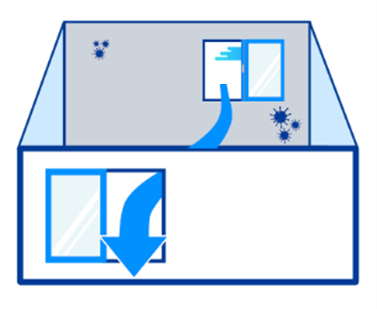Having
good ventilation and air filtration in schools is important. Bringing in
outside air (ventilation) and having filters to clean the air improves air
quality. This helps reduce the risk of respiratory infections that spread
through the air. Improving indoor air quality also creates a healthier school
environment. This is by limiting exposure to harmful chemicals and wildfire smoke (PDF). In addition, better air quality can
increase student performance and
attendance. School
administrators should work closely with their facility managers and air quality
professionals to implement this guidance and associated
references.
Outdoor Air and Filtration: Requirements and Recommendations
The California building code (Title 24) specifies the required minimum outdoor air ventilation rate for classrooms. That includes those with a mechanical ventilation system at the time that their building permit was issued (newly constructed buildings, additions, and alterations). For most classrooms, Title 24 requires at least 15 cfm/occupant or 0.15 cfm/ft2 of outdoor air, whichever is greater. Classrooms without a mechanical ventilation system must have windows with a total openable area of at least 4% of the floor area.
However, to prevent the spread of respiratory infections and decrease absenteeism, CDPH recommends providing a minimum of at least 5 air changes per hour or 30 cfm/occupant of equivalent clean airflow, whichever is greater, in occupied classroom environments. This goal can be achieved through a combination of ventilation with outdoor air and filtration using HVAC filters and/or portable air cleaners. For more information on calculating equivalent clean airflow, see the California Department of Public Health (CDPH) Guidance for Ventilation.
Classrooms can achieve these requirements and recommendations by using the following Strategies:
Optimize
or Upgrade Your Mechanical Ventilation (HVAC) System

A heating, ventilation, and air-conditioning (HVAC) system reduces hazards in the air. This is by pulling in outdoor air and circulating indoor air through filters. Work with facility managers when reviewing the CDPH Guidance for Ventilation. Work with indoor air quality or ventilation professional on HVAC system upgrades.
Open Doors and Windows (Natural Ventilation)

While natural ventilation can improve air quality, it is only useful when outdoor air is safe. Open windows and hallway doors on opposite sides of the room to create a cross draft. This is the best way to introduce outside air. Use carbon dioxide (CO2) monitors to determine if enough outdoor air is being brought in a room. This includes natural or mechanical ventilation. Levels above 800 parts per million (ppm) CO2 can show more outdoor air is needed.
Add Portable Air Cleaning Devices (PACs)
PACs are important during wildfire events when windows an d doors need to be closed due to poor outdoor air quality. Place PACs in classrooms (PDF) to supplement mechanical and natural ventilation. Purchase PACs that are best fit and size. Along with, PACs that have High Efficiency Particulate Air (HEPA) filters. HEPA filters remove infectious particles by filtering them out of the air. Avoid PACs that have ionizer, ozone, or other cleaning methods that add chemicals to the air. Alternatively, a low-cost DIY PAC can be a temporary option but not for permanent use.
Resources
Originally published on September 27, 2023